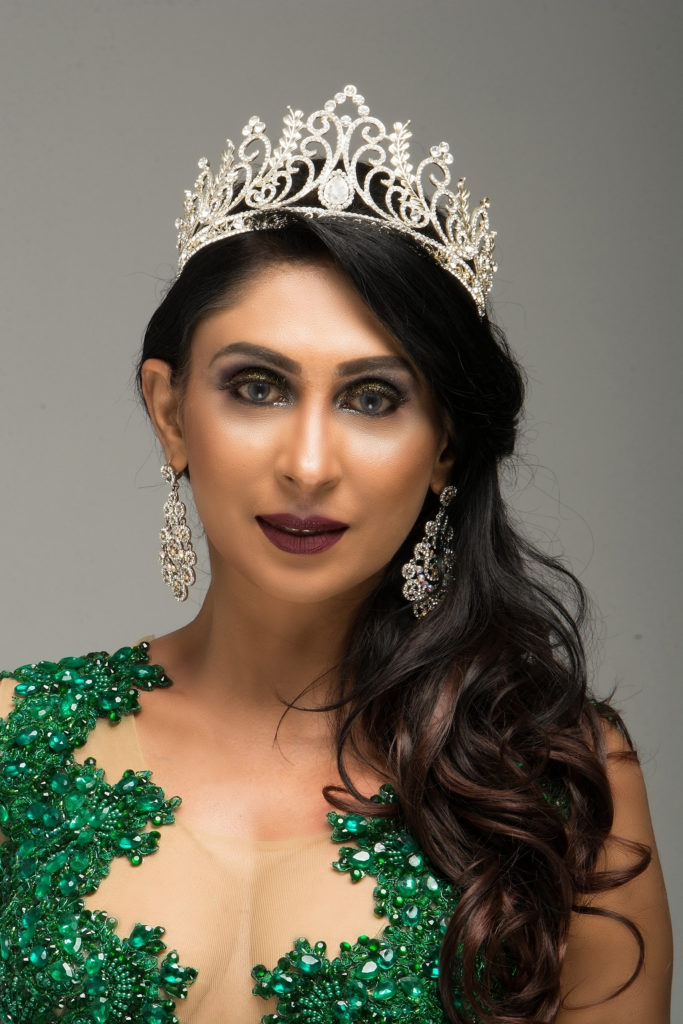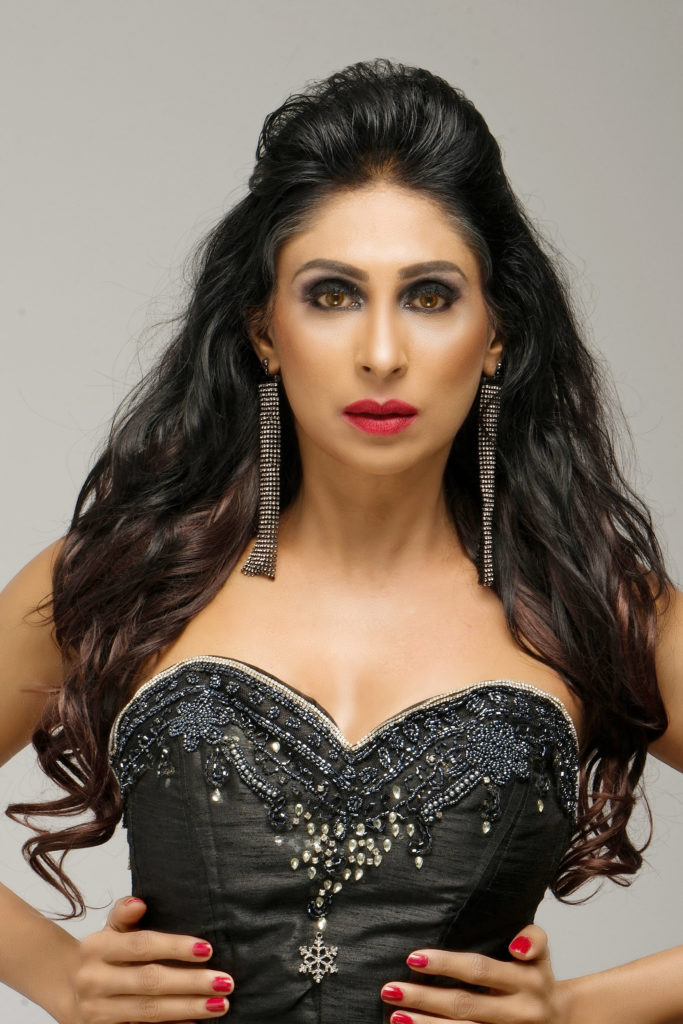
Chandi has come a long way since coming into the Top 10 at the Mrs International pageant in 2016. This multi-talented personality, with a background in makeup artistry, basketball and fashion, has been recognized with the ‘Silpathorn’ medal by the Chiang Mai Province of the Government of Thailand for her voice against Child prostitution in Thailand. On International Women’s Day 2016, she was also presented with the Women’s Excellence Award of Recognition for her work against Child Abuse by former Sri Lankan President, Her Excellency Chandrika Bandaranaike Kumaratunga. And that’s not all: Chandi has also recently been conferred the title of Global Goodwill Ambassador by the Chairman of the Board Kofi Annan, the former Secretary-General of the United Nations. We at Esteem Magazine talked to this lovely lady with beauty and brains on how she plans to continue working and fighting for the unheard voice of innocent children.
Hi Chandi, thanks for taking the time for this interview and congratulations on what you are doing with the GGA organization. So, for the benefit of our readers, what is a Global Goodwill Ambassador…what is their role and what are the skills needed to be nominated as a GGA?
A Global Goodwill Ambassador (GGA) is a recognition given to a person’s humanitarian work with no bias. GGA is an initiative that aims to bring together individuals across the world who serve their communities passionately in multifarious ways, to make a positive impact in society ensuring social justice, social equity and human dignity. As a GGA, I am committed to treat all individuals with a sense of dignity, respect and worth irrespective of anyone’s birth circumstances, race, religion, gender, disability or any other differences and denounce sexual harassment and child abuse. To be nominated, you need to be engaged in charitable causes, volunteer or engage in humanitarian pursuits, as well as have an ethical behaviour which is the code of conduct that has been accepted and approved by the GGA board. In fact, the GGA does not ask anything from an ambassador simply because they are already working for noble causes. The philosophy and mission is pure of heart, non-commercial and through the power of good people, we aim to create a ripple effect over time that changes our world. With all of the above, I am humbly proud to be recognized and saluted into the GGA family.

How can people working for children’s rights take advantage of GGA activities for their purposes?
GGA is a globally recognized organization that assists us in rules, guidelines, policy and procedures. It enables community service and life-sustaining assistance, durable solutions and implementing effective programmes.
You are involved in something really tough. In a country like Sri Lanka, it is not easy to be a child-rights activist. What has been your biggest challenge with regard to this?
There are number of government and non-government organizations working towards protecting child rights. Are they safe? My answer is NO. As the numbers are rising in child abuse and violations, not being able to protect them is a shame. The reason for this is that everyone is trying to achieve this on their own, with absolutely no unity. This has been the biggest challenge I have been facing. To overcome this, the Government cannot work alone or vice versa. This has to be the effort of a nation. We cannot get into numbers or statistics as it’s depressing and alarming. We need to focus on reducing these numbers. A child will not choose to get raped or pregnant, they have definitely NOT chosen to sacrifice their childhood. United Nations once stated that Sri Lanka is a ‘paradise for paedophiles’. For an effective response to this violence, we MUST work together.

Through your work, I’m sure you met many influential people and heard many amazing stories. Are there any of these experiences that you’d like to share?
My late maternal grandfather, the great Richard Aluwihare is undoubtedly the most influential person in my life. He was a wise man and achieved a huge amount in life. He worked his way up in society and was recognised for playing an incredible part in it. He raised amazing children, some being great sportsmen who represented Sri Lanka. He was a soldier who fought for the country back in World War 2. His life experience has given him wisdom that only some are privileged to have. This, paired with his kind and thoughtful heart, has made him one of the most influential people in my life and the best teacher I had ever known. He taught me what to value, to accept wins and losses graciously, how to plan my future and he told me the most amazing feeling you can ever own is to lend your hand before being asked. Of course I’m blessed with amazing caring parents. However, the impact he made on me decades ago refined me as a woman with passion and wisdom. Most importantly he told me “Don’t try to fit in, draw your own picture and colour it the way you want and never fade into the background.” From then till now, I have never faded away.

What’s your take on child slavery? Are people more educated on that front today than they were before, say 20 years ago?
Let me put this in a very subtle way. There is no child labour in Sri Lanka as the Government has stern laws with regard to this matter. But, a greater portion of school-going children from the age of 5-17 years were rattling their education with economic and/or housekeeping activities. More boys than girls are involved in economic activities to contribute to their families. A significant number of children, both girls and boys, are unable to attend school because of this. There is a loophole in that where one can really question if the child labour is abolished in Sri Lanka. Again this is mainly due to poverty and is subsequently opening doors to poor performance in schools, no time for leisure or school, fatigue, physical, emotional or sexual abuse, injuries and poor health. The minimum age for admission for regular work has been changed to 14 years, as long as work is not likely to be harmful and interfere with their schooling or emotional pursuits. Again, my question is where do we draw the line?
Is there a correlation between the education system and child exploitation?
I believe so. Education is a crucial component of any effective effort to eliminate child exploitation. There are many interlinked explanations for this. Poverty and social exclusion, labour mobility, discrimination and lack of adequate social protection and educational opportunity all come into play in influencing child exploitation.

What do children mean to you?
Strange as it may sound, one overpowering new feeling I felt when I had my son was, “Wow, so this is how much my mom loves me!” My love for my own child is so visceral, it made me appreciate my own mother as well as every other MOM biological or otherwise. Do you think life will flourish without the sound of a child? Having children brings an increased sense of meaning into people’s lives. It gives us a reason for living. Children are born innocent and guiltless where they are seen as pure and sin-free. They are the most beautiful and wise creatures to grace this earth. Is that only my child? NO. Most parents want to protect their children from the bad world we live in…but what about the rest of them? The ones that have no parents, the ones on the streets, the ones who have been abused, the war victims…to love, protect, care, provide basic needs, is a legal and moral obligation of mine and all of ours.
We still see parents push their kids a lot these days, especially in academics. Does that worry you?
Can I say something that could be alarming? Children are abused more by their parents than anyone else. As a child, you’re pushed and pulled to become something you’re not. Every child is unique and has their own hidden talent, but you need to allow them to explore and find what their inner talents are. At the age of 10, a child sits for the scholarship exam… has anyone responsible realized the pressure build up in that little head?! Can you imagine the pressure the leads them to commit suicide at that age?! If each school has the same syllabubs why are they required to change schools? Don’t they all sit the same exam at the end? If the Government can provide proper trained teachers to all schools and the basic requirements to each, these children will have and experience a better childhood than this. Their knowledge is limited to a textbook and they are forcibly made to by heart it and then sit and write the questions written in some abnormal way to make that innocent soul confused. My suggestion is to introduce ‘learner-centred education’ where children learn through the practical knowledge which will sink in to the core. This method puts student’s interests first, acknowledging the student voice as central to the learning experience. This focuses on skills and practices that enable lifelong learning and independent problem-solving. I am strongly against this pressure on children. A parent trying to sit an exam through their child is unknowingly destroying their own child.

What would you suggest the local community do to support your work on Children’s Rights in Sri Lanka?
I think as a nation, we all have a role to play in protecting our future. Communities and neighbourhoods play a very important role in ensuring the safety and well-being of children. There is a role for every individual to play in this. Be it the parents, the teacher, relative or the whole community, everyone can ensure that abuse or violence is socially unacceptable and offer vital support for the successful development of our future generations.
Text: Michelle Alles
Photography: Eranga Pilimatalawwe
Hair & Makeup: Amila Liyanage
Chandi Aluwihare Delwala
